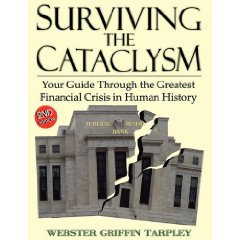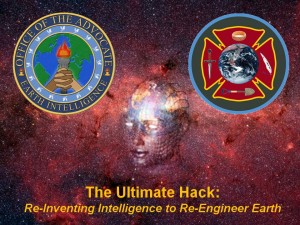
Three for Lacking an Index, Beyond Five Stars for Content
July 25, 2009
Webster Griffin Tarpley
This extraordinary work, first developed in the mid-1990's and updated recently for a second edition, would normally receive 3 stars from me for lacking an index. I know the author and I admire Progressive Press, but to put out a book of this quality in terms of content, without taking the week needed to create an index, is to me as a professional utterly unforgivable. I urge the publisher to create an index online and modify the description here at Amazon to alert readers to the availability of an index. Without an index for looking up Greenspan, Rubin, Goldman Sachs, or Morgan Stanley, this book loses half its value.
OK, that's the end of the rant. The content of this book–given that it was written a decade before Senator Phil Gramm (R-TX) was bribed by lobbyists to put 200 pages of deregulation into a bill five minutes before it was to be voted on (and all Senators voted knowing this)–is beyond five stars. This is precisely the kind of knowledge that many, not just this author, have been putting before the public without effect since at least the 1970's.
At $26 this book is a gift and I urge one and all to buy it as both an education and as a keepsake. The author, whose books on Bush, on Obama, and on 9-11 I have found to be superbly researched and ably presented, is one of the modern greats in historical fact-finding and investigative history.
Up front he lays out a five point program for overcoming the world depression, and I am pretty sure that the Goldman Sachs executive now in charge of the US Treasury has absolutely zero interest in this public intelligence. The plan:
1. Measures for re-regulation, nationalization, neutralization of fictitious capital, combating speculation, plus bankruptcy procedures and the preservations of labor, plan, and equipment. This includes the deletion of toxic derivatives (rather than the criminal lunacy of buying them at public expense) and an end to adjustable rate mortgages and foreclosures (I called for this in October 2008 to no avail, see my own book, Election 2008: Lipstick on the Pig (Substance of Governance; Legitimate Grievances; Candidates on the Issues; Balanced Budget 101; Call to Arms: Fund We Not Them; Annotated Bibliography)
2. Nationalize the Federal Reserve System and re-start lending and the credit system generally. [I stand with Ron Paul in calling for its elimination after an interim period of public control, I am certain the audit that is being planned will reveal high crimes and misdemeanors such that I would keep Guantanamo open just to hold the Fed and Goldman Sachs and Morgan Stanley and City-Bank executives, among others, until we reclaim their stolen wealth from the public. The author includes here zero interest loans for real physical production and construction.
3. Restart borrowing for production with a vast program of infrastructure development and science drivers for the modernization and recovery of the economy.
4. Emergency relief for the victims of the depression. I would note with Ron Paul that inflation is a tax, and stand with Thom Hartmann, whose book Screwed: The Undeclared War Against the Middle Class – And What We Can Do about It (BK Currents (Paperback)) complements The Working Poor: Invisible in America and The Global Class War: How America's Bipartisan Elite Lost Our Future – and What It Will Take to Win It Back. The hard-working normal average people have been ABUSED by Goldman Sachs specifically and Wall Street and the Fed generally. ENOUGH!
5. International economics and a new world monetary system. The author does not delve into Open Money or what Yochai Benkler calls The Wealth of Networks: How Social Production Transforms Markets and Freedom, Alvin Toffler Revolutionary Wealth: How it will be created and how it will change our lives or first one to notice, Barry Carter, Infinite Wealth: A New World of Collaboration and Abundance in the Knowledge Era but now is certainly the time to move forward with no logo, buy local, end of absentee ownership of land, end of corporate personality protection not intended, and so on.
The author itemizes $12.8 trillion in gift money from the taxpayer to the bankers at our expense, and this is a debt that I hope we not only renounce, but follow up with a confiscation of the overseas accounts where all of our money has been converted into foreign currencies so that the bankers can literally double their money–I am not making this up–when Obama declared a bank holiday and federalizes the police in late August or early September, and the US dollar devalues to half its current value (which is in turn half its value in the early 1970's).
Most of us do not need to read this book in its entirety, especially those of us on heart medication. This is a thoughtful balanced book that will make any intelligent person with integrity ANGRY. America remains a great Nation in its people and its land, but its leadership is criminally corrupt and has committed treason against the public since at least 1974 when Peak Oil was first briefed to the Senate and Exxon/Esso and the banks persuaded the U.S. Government's political leadership to ignore the research and carry on with Empire as Usual.
The re-issuance of this book validates and vindicates the author's research and integrity, and I for one, as the top Amazon reviewer for non-fiction, am more than pleased to stand alongside Webster Tarpley, pledging my sacred honor to the Republic–the sovereign people of American who created the federal government as a SERVICE. The federal government is NOT in charge, Goldman Sachs and the Fed are. It's time for a non-violent revolution, and I believe that books like this need to be in circulation among the two thirds of the eligible voters planning to kick the two-party tyranny out of office in 2010.
Webster Tarpley is an American hero in the tradition of Paul Revere.
See also:
Grand Illusion: The Myth of Voter Choice in a Two-Party Tyranny
Running on Empty: How the Democratic and Republican Parties Are Bankrupting Our Future and What Americans Can Do About It
A Power Governments Cannot Suppress

Click Here to Vote on Review at Amazon,
on Cover Above to Buy or Read Other Reviews,
I Respond to Comments Here or There








